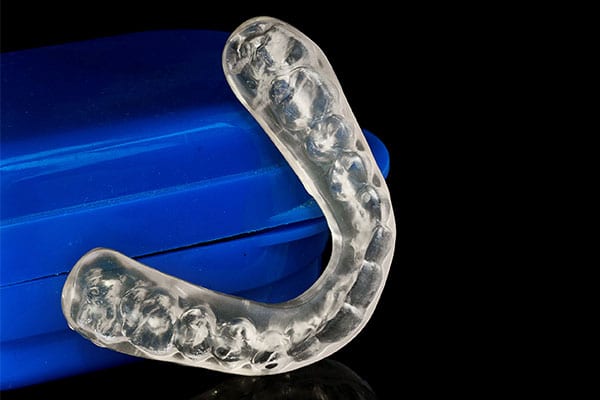TMJ Treatment in Stuart, FL

Stuart Prosthetic Dentistry provides TMJ treatment in Stuart, FL. Call our office today at 772.286.1606 to schedule an appointment.
The temporomandibular joint (TMJ) connects the jawbone to the skull. TMJ disorders often cause discomfort in the cheek, jaw, or ear areas and can affect normal jaw function.
In less severe cases TMJ disorders can be treated with self-managed care (eating soft foods, using ice packs, avoiding extreme jaw movement) or nonsurgical treatments (anti-inflammatory medications, Botox injections, or stabilization splints). In more severe cases, surgical treatments (jaw joint replacements) may be necessary.
TMJ conditions fall into three main categories:
- Myofacial pain - discomfort or pain in the muscles that control jaw function (grinding teeth can result in this type of TMJ disorder)
- Internal derangement of the joint - a possible indicator of a displaced disc, dislocated jaw, or injury to the condyle
- Arthritis - a degenerative inflammatory disorder
Signs and symptoms of TMJ disorders are frequently intensified by stress and can include:
- Headaches
- Soreness in the cheek or jaw area
- Pain in or around the ears
- Facial pain
- Tight jaws
- Popping or clicking sounds when opening mouth
- Locking of the jaw
- Difficulty chewing
How is TMJ treated?
For some patients, the disorder may disappear by itself. For others, they may come and go, or may worsen over time. TMD is managed, rather than cured. There are several ways TMD can be managed, including:
- Stabilization – A well-made night guard, properly fit and adjusted, is capable of preventing many of the symptoms related to TMD. When used in this capacity, they are often referred to as an occlusal appliance, stabilization appliance, bite splint, or bite guard. As a prosthodontist, Dr. Tyler has received advanced training to make these appliances. In order to be an effective treatment to alleviate the symptoms of TMD, the appliance needs to be adjusted in a very precise way, sometimes taking multiple chairside adjustments to achieve the desired relief of symptoms.
- Equilibration – fixing an uneven bite by adjusting or reshaping some of the teeth. Orthodontic treatment. Medicines to reduce pain or inflammation, or to help you relax. Exercises to strengthen jaw muscles. Modifying the pain with heat or ice packs. Eating softer foods for a certain period of time or avoiding foods that cause symptoms.
- Orthodontic treatment.
- Medicines to reduce pain or inflammation, or to help you relax.
- Exercises to strengthen jaw muscles.
- Modifying the pain with heat or ice packs.
- Eating softer foods for a certain period of time or avoiding foods that cause symptoms.
- Surgery – Only if TMD symptoms are significantly decreasing your quality of life and all other options have been attempted without relief is this recommended by Dr. Tyler.

Frequently Asked Questions About TMJ Disorder
How do you fix TMJ?
TMJ pain does not have a one-size-fits-all solution. Finding the best treatment for you means determining the underlying reason for your TMJ disorder, as treating TMJ pain caused by teeth grinding differs from treating TMJ pain caused by arthritis. Stabilization appliances, equilibration, anti-inflammatory medications, and physical therapy exercises are some common treatments Dr. Tyler uses for TMD. During flare-ups, self-managed care, such as eating soft foods and using ice packs to reduce inflammation, can also provide relief.
Can TMJ go away on its own?
TMJ pain can go away on its own, especially if it's exacerbated by a stressful time in your life or caused by an injury, but if it persists, it's important to get treatment to avoid lasting joint damage.
How can I fix my TMJ without surgery?
Surgery is considered a last resort for TMJ disorder. Stabilization splints, orthodontic treatment, and anti-inflammatory medications are less invasive options than surgery if self-managed treatment hasn't provided relief.
Do night guards really work?
Yes, a night guard or stabilization splint will relax your jaw muscles and reduce inflammation and pain if your TMJ pain is caused by teeth grinding and jaw clenching.
Does stress make TMJ worse?
TMJ dysfunction and stress are closely related, although stress doesn’t directly cause TMJ pain. Many patients have muscle tension as a result of stress, and this muscle tension can cause or exacerbate jaw clenching and teeth grinding.
